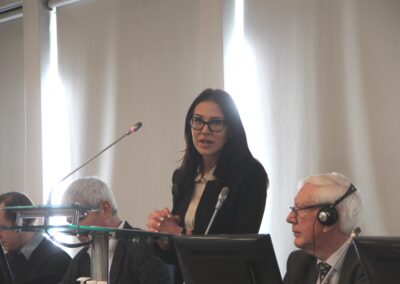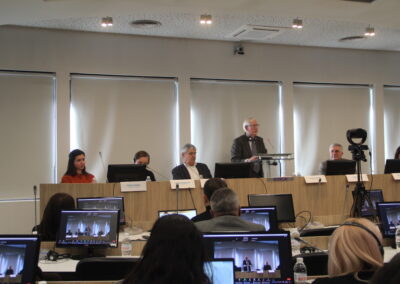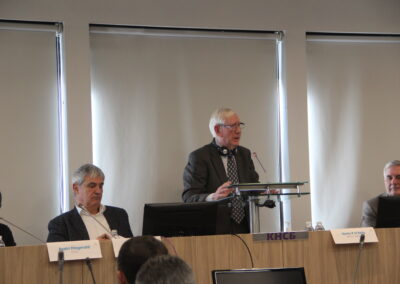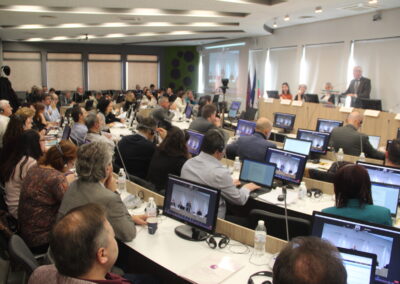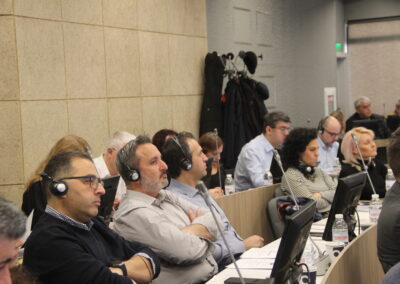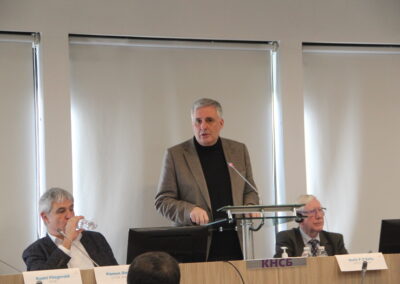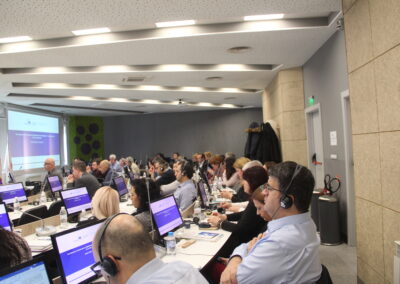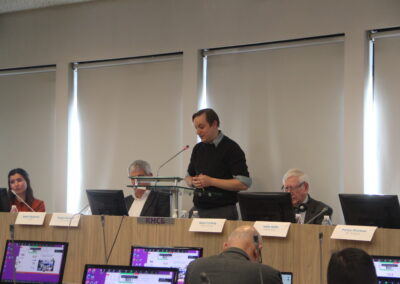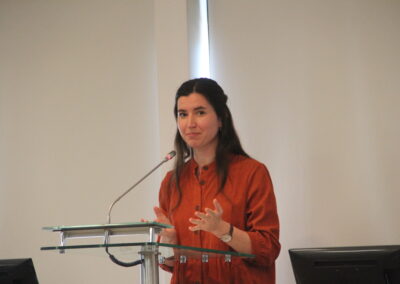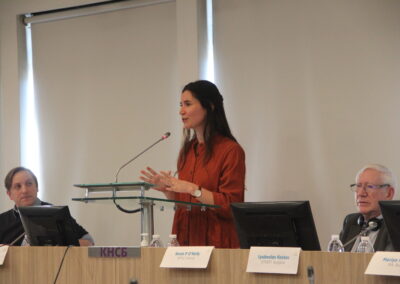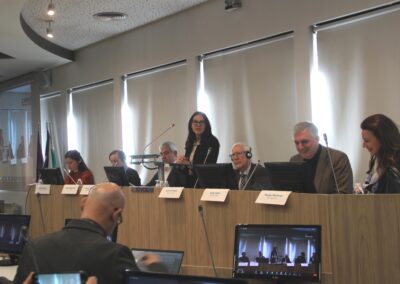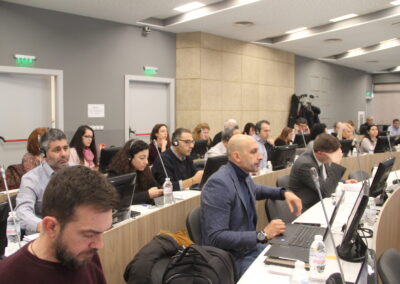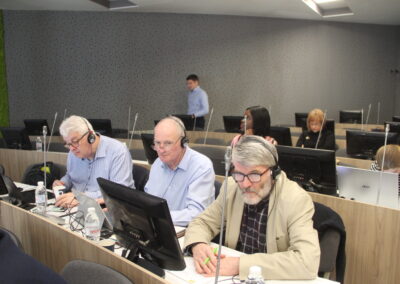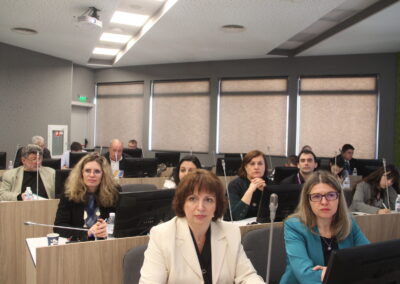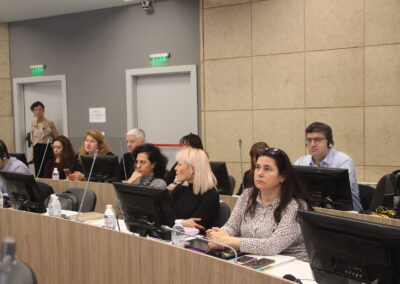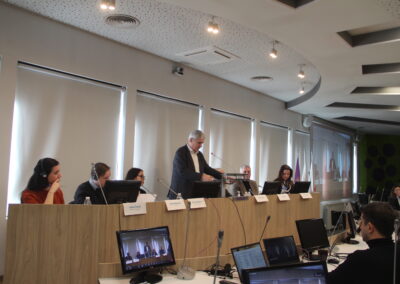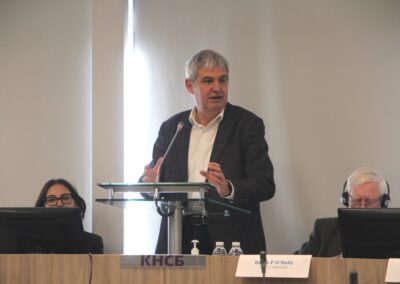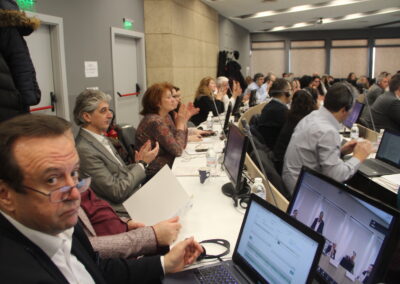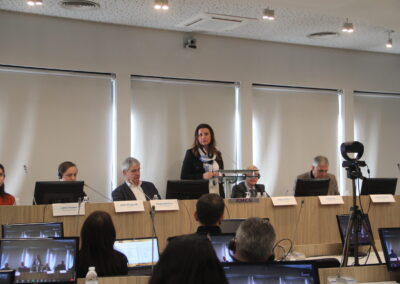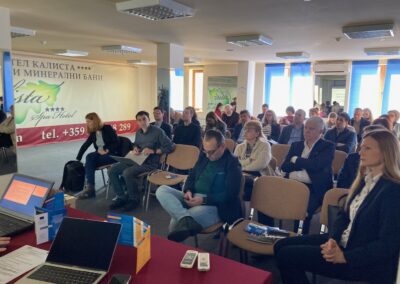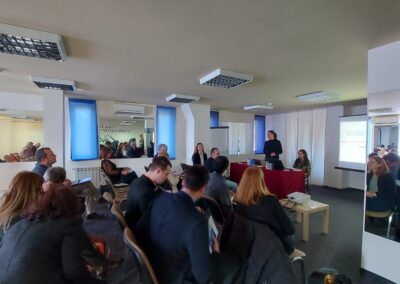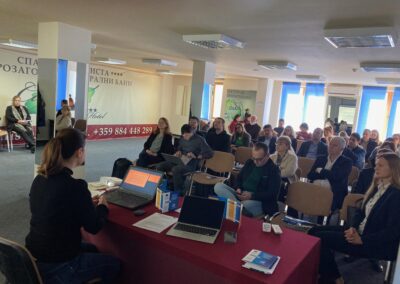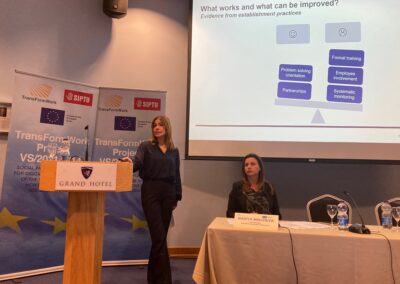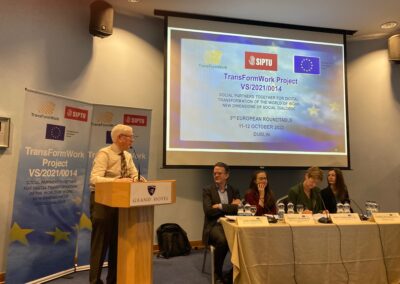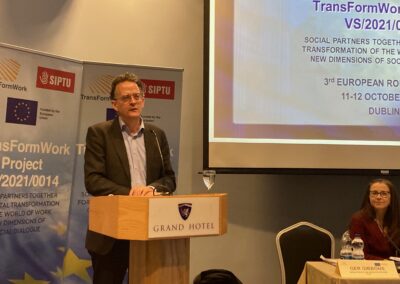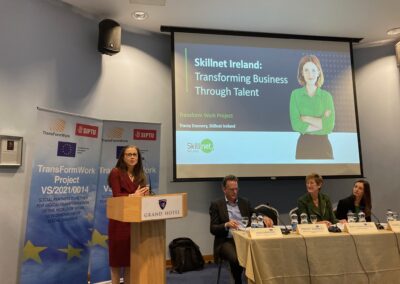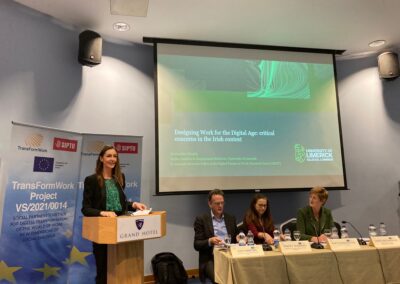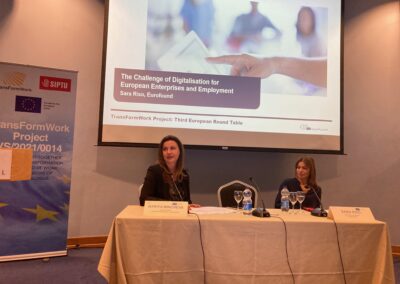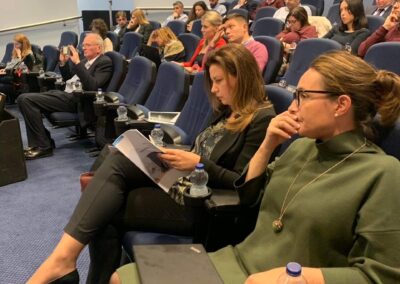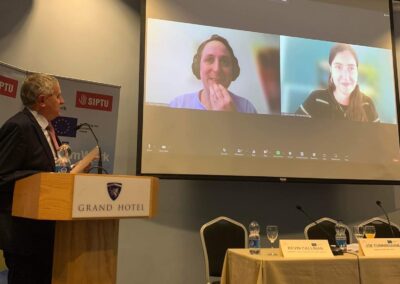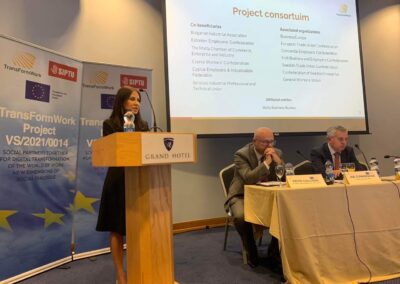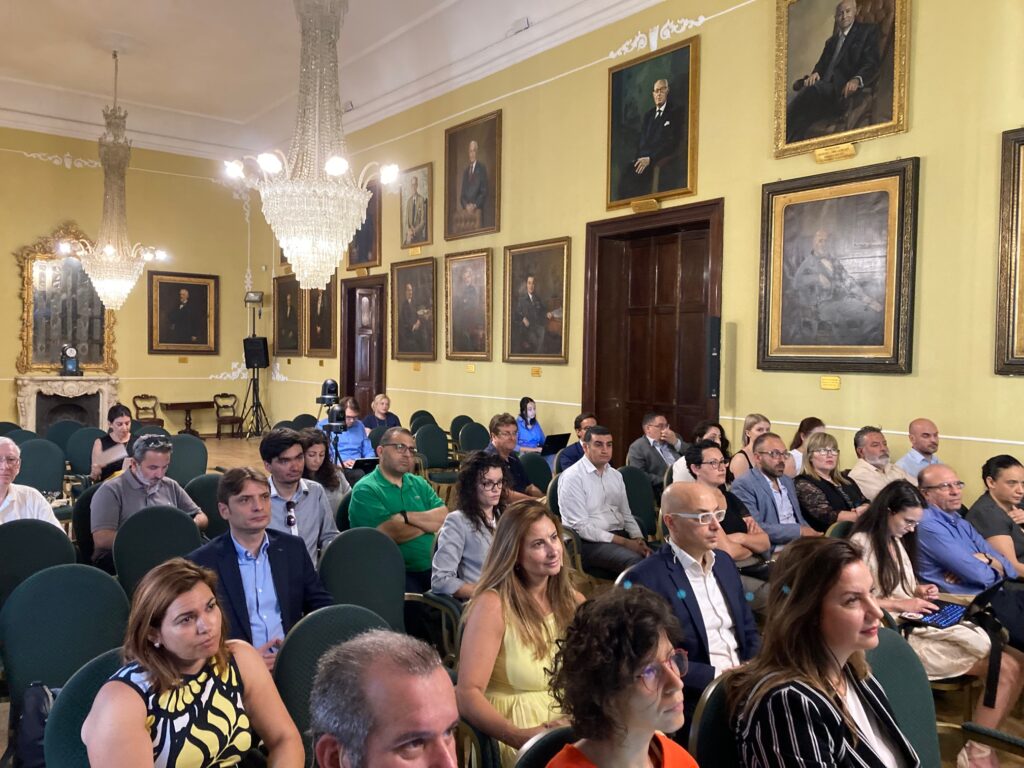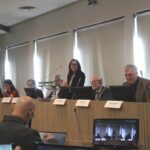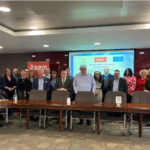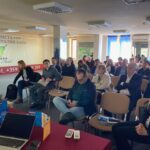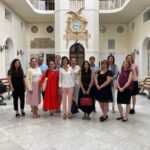REPORT
The third European Roundtable was held in Ireland on 11-12 October 2022. The opening day of this event focused on the Europe Social Partners Framework Agreement on Digitalisation and in particular on its relevance to new technology developments within the EU. The second day debated the relevance of the Framework Agreement to the Irish context and the views of the national social partners. It was attended by over forty participants, of which seventeen were from the project partner Member States.
11 October 2022
He was pleased to see a number of participants from SIPTU, from other Irish trade unions and from business and workers’ organisations, as this project is an important learning experience for SIPTU and the whole Irish trade union movement. As with other EU Member States, the Irish trade unions face the difficult challenges of dealing with organisational change resulting from the increased use of new technologies, robotics and Artificial Intelligence (AI).
Kevin Callinan, President, Irish Congress of Trade Unions (ICTU) and General Secretary, FÓRSA (the public sector trade union), gave the opening address to the Roundtable. In doing so, he said that digitalisation and climate change are two of the biggest issues facing society today and for future generations. Ireland is no stranger to embracing technological change and was an early participant in the technology age. From the emergence of digitalisation, Ireland has been the location of choice for computer manufacturing, providing high levels of employment. He said that Ireland has shown it can adapt and embrace the changes that society faces and that he is sure it will continue to do so with creativity and energy.
ICTU has played an active part in working with Government, Employers and other Civil Society Organisations in addressing these challenges, in particular those faced by workers across public and private sectors organisations.
He went on to discuss the issue of remote working, saying that the ICTU has been very vocal in supporting development, something now made possible because of technological advances which were accelerated during the COVID-19 pandemic. He said that remote working makes good business and economic sense. It can open up employment opportunities for people with a disability, carers and older workers, widening the talent pool, improving workforce diversity, narrowing the gender pay gap and income inequality between households. It can also benefit the environment and rural regeneration. That is why trade unions were the first to call for legislation on the right to remote working, bringing Ireland into line with long-established employment law in most other EU Member States.
While the Government is committed to introduce remote working legislation, the priority of the ICTU now is to ensure that the proposed legislation is fit for purpose and that remote working does not come at the expense of hard-won worker’s rights or lead to greater casualisation and outsourcing of jobs. Remote working also presents challenges and dangers for workers, particularly in terms of isolation and, in the long-term, how remote working impacts on women workers in areas such as pay equality and access to promotion opportunities.
One of the earliest and most far-reaching achievements of the trade union movement is the shorter working day. The ICTU has long advocated for concrete actions to achieve work-life balance, including the regulation of hours of employment. In this context he drew attention to another, related, issue, the right to disconnect. With so much technology and an ‘always on’ culture, workers must be protected and ensure that burnout, fatigue and stress do not become greater dangers in terms of workplace safety and health. He also expressed the ICTU support for the global campaign for a 4-day week.
In hoped that this important Roundtable will be a success, Mr Callinan concluded by saying that the Framework Agreement on Digitalisation, represents an important opportunity to develop an agreed approach to implementing strategies around digital skills and securing employment as well as modalities of connecting and disconnecting.
– Study of the national contexts and the challenges to social dialogue of digitalisation in each participating Member State
– To exchange experiences and good practice in the implementation of the Framework Agreement
– To stimulate debate and raise awareness so as to improve the understanding of employers, workers and their representative organisations of both the opportunities and challenges of digitalisation
– To promote ‘good practices’ for the digital transformation of workplaces and to publish a Catalogue of Good Practices to assist employers’ and workers’ organisations
– To make recommendations on legislative changes in order to accelerate the implementation of the various aspects of the Framework Agreement.
The methodology adopted by the project is in four stages:
– ‘Desk’ analysis at the national level of the challenges from digitalisation to employment and the organisation of work
– Undertake an online survey of a) employers; b) worker representatives; c) HR managers, followed up by face-to-face interviews of a selected survey respondents
– Five national reports based on the ‘desk’ analysis, survey responses and interviews
– Publication of a Comparative Study of the five national reports.
It is proposed that the Framework Agreement will be presented in each participating country at two Information Days (a total of ten!) and it was intended that three European Roundtables would be held to present the research data and good practice examples. This Roundtable is the third of these Roundtables.
The complete the work of the project, a final European Conference will be held in Sofia during February, 2023. To follow the work of the project, participants in this Roundtable were invited to log on to the Project website: www.transformwork.ie
This presentation was followed by a joint online contribution from Ruairí Fitzgerald, European Trade Union Confederation (ETUC), and Isaline Ossieur, BusinessEurope.
It covers four key issues and measures to deal with the challenges of digitalisation:
– Digital skills and securing employment
– Modalities of connecting and disconnecting
– Artificial Intelligence (AI) and guaranteeing the ‘human in control’ principle
– Respect for human dignity and surveillance
While inviting national member organisations of the signatory organisations to implement and promote the Agreement within three years and have asked each national-level group of organisations to report back each year to the EU-level Social Dialogue Committee.
So far, these organisations in twelve Member States have reported having successfully started the process of implementation and a number of ‘best practices’ were highlighted from
– The Netherlands: The Social and Economic Council, in collaboration with the Social Partners, have set up a Digital Transition Working Group to:
o Monitor the impact of the digital transition
o Organise meetings and issue exploratory reports
o Ensure the internal coherence of ongoing Council activities with a digital component
– Austria: New legislation was enacted regulating ‘home office’ which includes provisions on working time and working conditions, such a safety and health. These new provisions were agreed between the social partners (AK; WKÖ; and ÖGB) and the Government and, with regard to implementing this new legislation, no difficulties have been reports from either the employers or from worker representatives
– Luxembourg: The Economic and Social Council and the social partners signed an inter-professional agreement on telework in October, 2020. This new agreement maintains the voluntary nature of teleworking for the worker and the employer. It regulates both regular teleworker and occasional telework by setting thresholds, which were absent from the previous legislation. Provisions on the right to disconnect have also been negotiated between the social partners and these have been incorporated into the Labour Code.
– Denmark: In October, 2017, a tripartite agreement on access to upskilling and improving the quality and flexibility in adult education and training was concluded. This agreement provided for €50 million to expand the programmes for adult education to include programmes on digital technologies. It was agreed, as part of the implementation of the Framework Agreement, to continue this agreement in October, 2021, for a further year and to re-negotiate it in 2022.
Following this presentation there was a range of questions from the participants on various issues, including clarification on some aspects of the national implementation examples.
Session 2 was chaired by Mariya Mincheva, Vice-President, Bulgarian Industrial Association (BIA). The session looked at recent research into digitalisation in the EU and the possible impact of artificial intelligence (AI) on the workplace and employment.
Sara Riso, Research Manager in the Employment Unit, Eurofound, who is involved in research projects in the areas of digitalisation, employment change and restructuring.
Her presentation covered the findings of the research undertaken as part of the Foundation’s input to the European Commission’s work programme – Priority 2: A Europe fit for the digital age: Empowering people with a new generation of technologies and focused on the
For example, in the Nordic and continental Member States there has been a long-standing debate focused on the human and ethical implications of digitalisation, in particular AI. While in Eastern Member States this is a relatively new debate, with a focus mainly on investment and infrastructure and skills related to the spread of digital technologies.
(It was noted that Ireland falls within the latter group of Member States and there is a need to start the national debate on the impact of digitalisation on the Irish labour market)
The research shows that problem solving and partnerships work well, while there is need for improvement in such areas as:
– Formal skills training
– Greater employee involvement
– Systematic monitoring.
She demonstrated how digital technologies impact on the organisation of work. The findings show that there is a negative impact on employee monitoring and control in most areas (although not with 3D printing!). Also, with regard to ‘job quality’ there were negative effects on ‘work intensity’ and on future ‘prospects and earnings’.
With regard to advanced robotics, the impacts were:
– Lower physical strains and reduced risk of injury, but a greater risk of negative psychosocial effects
– There is a move from manual work to ‘intellectual’ skills
– There is increased complexity in the interaction between the ‘human input’ and robots
– There is a potential for shorted working weeks, more part-time work, but a greater risk for workers been ‘on-call’ 24/7
– There is also less worker ‘autonomy’ because of the potential for increased monitoring through the use of technology.
This last point, regarding increased monitoring, can lead to threats to individual privacy, with implications for data protection issues, for negative psychological impact and an increased emphasis on the ‘measurement of performances’.
Also, related is this and the debate around ‘surveillance’, is the design of the technology to monitor worker performance. Regarding new technology trends that allow for monitoring practices:
– Technological advances have increased the possibilities of employee monitoring beyond work performance
– The move to remote work during the COIVD-19 pandemic has created a new market for a range of monitoring tools, including software to track computer based activity
– New organisational and management practices have emerged to facilitate the greater visibility of employees
– The rise of the ‘always-on’ culture is blurring the boundaries between workers’ private and work lives (work/life balance) – Six EU Member States have already addressed the issue of the ‘right to disconnect’!
‘There are no good or bad technologies, just management choices!!’
The second input for this session was an online presentation by Prof Alexiei Dingli, University of Malta, on Artificial Intelligence (AI) and its impact on work. He said that AI experts are rare and in a recent survey in Malta 10% of employers said that they were ‘not sure’ about AI. However, we are all involved in the use of AI on a daily basis, for example:
The ‘down-sides’, however, are a) that the initial capital investment is high, in particular, for small businesses and b) it might replace existing jobs, but some jobs would continue to be carried out better by humans, such as caring roles in health care and social services.
Research carried out by Oxford University estimated that up to 47% of jobs ‘will vanish’, while other estimates in the UK speculate on the loss of 10 million jobs in 15 year. In contrast, the Davos Economic Forum estimates that 85 million jobs will be replaced by machines, while 97 million new jobs will emerge. Furthermore, the Economic Forum estimates that 52% of working hours will be automated by 2025.
The future of work has already arrived for a large majority of the online white-collar workforce. Eighty-four per cent of employers are set to rapidly digitalise working processes, including a significant expansion of remote work, with the potential to move 44% of their workforce to operate remotely.
In his presentation, Prof Dingli listed a ‘top-twenty’ job roles that will be created or increase in demand and another ‘top-twenty’ job roles that will decrease or disappear. He also listed the ‘top skills’ in the workforce by 2025, all related to the increased use of AI.
Other potentials for new working are through, for example:
a) The Gig Economy, where enterprises, rather than employ full-time staff, hire part-time, temporary, independent contractors, or ‘freelancers’ – a process which is already well underway
b) The Platform Economy, such as Amazon, Uber and Airbnb
c) Digital Nomads, where worker can work from anywhere on the planet, so long as there is a digital connection!
So there is no possibility to slow or stop the ‘march’ of AI and robotics. Indeed, The European Commission has already called for Member States to prepare for the digital age:
We must make this Europe’s Digital Decade … There are three areas we need to focus – first, data; second, technology, in particular AI; and third, infrastructure.
12 October, 2022
The third and fourth sessions on the morning of 12 October focussed on the implications of the Framework Agreement for the Irish labour market.
L to R: Ger Gibbons, SIPTU, Tracey Donnery, Skillnet Ireland, Mary Connaughton (chair), CIPD
and Caroline Murphy, UL
Session 3 was chaired by Mary Connaughton, Director, CIPD Ireland, and the first contribution was by Ger Gibbons, Social and Legislative Officer, ICTU, who is involved in the national ‘reporting back’ process of the Framework Agreement for Ireland.
He explained that, under the Agreement the social partners in each EU Member State are required to submit reports on the progress made in its implementation in the first three years. He said this was a new experience for both ICTU and IBEC. They agreed to submit factual information on the four key areas of the Agreement – Digital Skills; the Right to Connect and Disconnect; Human Control of Artificial Intelligence; and Respect for Human Dignity and Surveillance.
The ICTU and IBEC, in the Irish reports drew attention to the submissions on relevant Government consultations, including on support for post-COVID employment, on the right to request remote working and the national digital strategy.
He went on to outline other issues involving the Irish social partners in the EU Social Dialogue framework, such as the European Commission proposals for a Directive on an ‘adequate living wage’. The EU Social Dialogue Work Programme, 2022-24, consists of six
joint actions:
– Telework and right to disconnect
– Green Transition
– Youth employment
– Work related privacy and surveillance
– Improving skills matching in Europe
– Capacity building.
Tracey Donnery, Director, Policy and Communications, Skillnet Ireland, presented the role that her organisation plays in skills training for the digital workplace. Skillnet is an Irish Government agency that works to identify and address the skill needs of businesses and enterprises, so that they will have a highly skilled digital workforce into the future.
The agency reports to the Department (Ministry) of Further and Higher Education, Research Innovation and Science and it is supported by the employer, trade union and other business organisations and is partnered by some fifty-plus sectoral organisations.
In 2021 it was responsible for over 9,800 training programmes for 86,500 trainees in 22,500 enterprises. These programmes cost in total €60.2 million. There are seventy-three sectoral and regional business networks contributing €22.5 million to the costs of these training programmes. The budget for 2022 is set at €80 million.
The work of Skillnet has the involvement of all the relevant State agencies and is carried out through eleven pillars, one of which is A Future in Technology. To date, 70% of the graduates from this pillar are now in technology jobs.
Skillnet also partners with the universities and third-level colleges, in particular the new Technology Universities, to provide advanced technical and leadership education programmes, through a wide range of MSc post graduate degrees in every aspect of digitalisation and new technologies. This initiative is also backed by the enterprise State agencies, such as the Industrial Development Authority (IDA) and Technology Ireland (an affiliated organisation of IBEC). Dell Technologies also partners with Skillnet on 167 transform initiatives .
Her presentation finished with ‘testimonies’ from a few of the past participants in Skillnet programmes – for example, Marijana, in data analytics and Mike, in software development. Michelle McKinney, Quality Training Specialist, Allergan, also gave positive feedback on the impact of Skillnet a training programme (in association with Technology University, Dublin) on the development of VR training for its workforce. All were very positive about their experience and how the training programmes impacted on their careers.
The final speaker in this third session was Dr Caroline Murphy, University of Limerick. Her presentation was on Designing Work for the Digital Age: Critical concerns in the Irish context,
posing the question: Is the future of work utopia or dystopia?
She drew on a 2020 study by the State training agency, Solas, which identified some 370,000 workers in Ireland whose jobs are at high risk of automation and a further 600,000 jobs were considered to be at ‘medium’ risk. The six groups whose jobs are considered to be most ‘at risk’ are:
– Operatives
– Sales and customer service
– Administration and secretarial
– Hospitality
– Agriculture and animal care
– Transport and logistics.
While Industry 4.0 focused on technical drivers, Industry 5.0 is about a knowledge based economy and this Solas report identified re-skilling and job redesign as crucial for the transition to Industry 5.0. To emphasis this point, Dr Murphy used the following definition:
Industry 5.0 recognises the power of industry to achieve societal goals beyond jobs and growth to become a provider of prosperity, by making production respect the boundaries of our planet and placing the wellbeing of the industry worker at the centre
of the production process.
Within this concept, such actions as Corporate Social Responsibility (CSR) and the United Nations Environmental, Social and Governance goals (ESG) will be increasingly important.
From her research a number of critical issues are emerging:
– Productivity – critical for economic growth
– Scalability – administrative roles, including support roles, such as finance and IR
– Employee involvement – encouraging key tech interests
– Employee wellbeing, cultural and role changes:
- Organisations struggle with remote / hybrid working
- Jobs need to have a ‘pull factor’
- Ergonomic, health and safety issues
- Young cohort of workers want high pay and job security.
Participants in the Roundtable
Brian McGann, Head, Organisational Development & Support Services, SIPTU, and TransFormWork Project Co-ordinator, Ireland, chaired Session 4.
– Organisation of the Working Time Act, 1997
– The Safety, Health and Welfare at the Work Act, 2005
– Employee (Miscellaneous Provisions) Act, 2018
– Terms of Employment (Information) Acts, 1994 to 2014.
Under the Workplace Relations Act, 2015, the relevant minister can request the Workplace Relations Commission (WRC) to draft a Code of Practice on an issue of relevance to employment relations. Such Codes are written guidelines agreed, after a consultative process and set out guidance and best practice for employers and employees to comply with employment legislation. Adhering to Codes of Practice is voluntary, but can be used in legal cases as evidence of a breach of employment rights.
With regard to the Code of Practice dealing with the right to disconnect, it outlines the rights of employees to disengage from work where a worker’s duties are through electronic communications, such as e-mails, ‘phone calls, etc., outside normal working hours. The objective is to protect employees working remotely from working excessive hours.
Employer obligations under the Code are:
– To provide detailed information to employees on their working time
– Ensure that employees take rest periods
– Ensure a safe workplace, including reviewing the risk assessment and, where necessary, the safety statement
– Take into account their obligations to
o …managing and conducting work activities in such a way as to prevent, so far as is reasonably practicable, any improper conduct or behaviour likely to put the safety, health and welfare at work of his or her employees at risk
– Not penalising an employee.
For their part, employees are responsible for:
– Ensuring that they manage their own working time
– Co-operating fully with any appropriate mechanism utilised by an employer to record working time, including when working remotely
– Be mindful of their colleagues, customers/clients and all other people’s right to disconnect
– Notifying the employer in writing of any statutory rest period or break to which they are entitled to and were not able to avail of on a particular occasion and the reason for not availing of such rest period or break.
– Being conscious of their work pattern and aware of their work-related wellbeing and taking remedial action, if necessary.
The Code of Practice recognises that there may be occasional circumstances where communications are sent and received outside normal working hours. If, however, contacts outside normal working hours becomes the norm, then this should be addressed by the employer.
Tara Coogan was followed by a pre-recorded video presentation by Erik O’Donovan, Head of Digital Economy Policy, IBEC.
The key points from his presentation covered issues such as:
– Why digital transformation matters
– What is the policy / strategy on digitalisation
Leadership
- European digital compass – EU targets for 2030
- Infrastructure
- Skills
- Digitising the public service
Trust
- Safeguarding rights and safety
The internet is 39 years old, but there have been much more advances in technology in the past 5 years
What next? IBEC publication: Backing our digital future
Digital inclusion important for social inclusion
The final presentation of this session and of the Roundtable was by Aidan Connelly, CEO, Idiro Analytics. website, if you are a robot? and to click on the photos with traffic lights, you are teaching an algorithm for AI!
In the history of mankind, progress in technology developments has been slow. From the beginning of the 19th century machine technology began to impact on the workplace and this has accelerated during the past two centuries to where there is now an equality between human and machine input at present as machines are ‘taken over’ from humans work tasks through robotics and AI. He estimates that by 2035 machines will have replaced human input and will continue to do so thereafter.
As AI is further developed into the future, it will have the ability to reason like a human, self-learn and ultimately have human cognitive abilities, changing the world of work in unimaginable ways. Mr Connelly listed possible areas where AI been developed and is already in use, including:
– Language translations
– Document research
– Drug discoveries
– Facial recognition.
Economically we could see raising unemployment at the same time as economic growth, so there is a need for planning for ‘liveable’ incomes. The societal impact may affect relationships, cause a disconnect from ‘reality’ and social unrest. There is also already the growing application of robotics and AI for military use, the use of autonomous drones and missiles, and the use of cyber-hacking of energy, water and transport infrastructure, as we already see in the Ukraine war.
However, AI can be used for positive societal uses, for example:
– Advances in pharmacology, genetic sciences and customised medication
– Better and more accessible health care
– Automation of transport and manufacturing
– Development of new materials
– The reduction and/or elimination of repetitive tasks
– Reduction of errors
– More efficient public services through the application of AI for e-government.
He stressed that we can’t ignore AI, as it also has significant positive aspects. However, human control is paramount and the following are some of the issues that we need to address to ensure the ‘human in control’ principle:
– EU legislation on AI needs to regulate the more destructive use of AI
– Transparency is vital and should not be left in the hands of technologists alone
– AI auditing should become ‘common place’
– We need an Irish legal framework for AI
– We need better sharing of and access to data, in particular State held data
– There is a need to focus on educational efforts to understand AI
– AI ‘literacy’ is needed at governmental and business levels
– We need greater investment in advanced AI research and regulatory innovations.The Roundtable was closed by the chair, Brian McGann. He thanked all the speakers for their presentations, the participants from Ireland and from the other partner countries, the staff of the Grand Hotel, Malahide, the technical staff who provide the audio-visual systems and the online links for those speakers who contributed to the Roundtable from Brussels and Valletta. He also thanked the SIPTU team involved in the planning and organisation of the event, which he said had been very interesting and successful.
In conclusion, Kevin P O’Kelly, Project Researcher, outlined the programme for the remainder of this project, which includes a Steering Committee meeting in Liberty Hall, the HQ of SIPTU, immediately after the Roundtable. The final consolidated report will now be prepared and a further Steering Committee meeting is scheduled for Cyprus in January to ‘sign-off’ on this report, which will be published as part of the final conference in Sofia in February, 2023.

